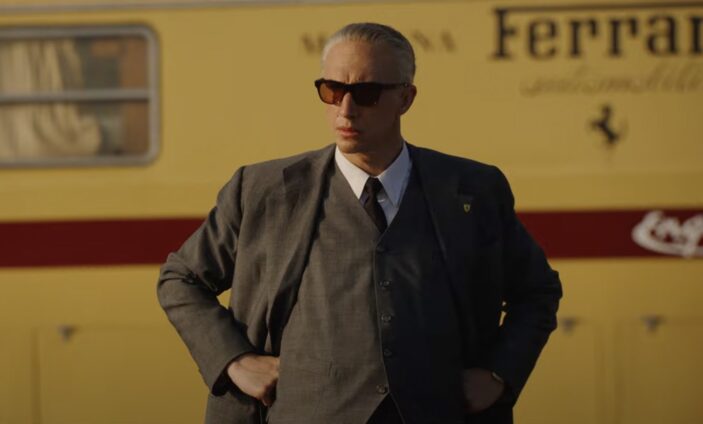
Compared to the other “exceptional man” biopics of the last year (Oppenheimer, Maestro, Napoleon), Michael Mann‘s Ferrari is, sadly, the least interesting. Whilst it doesn’t take an entirely traditional narrative – the film only shows us a certain chunk of the man’s life – and Adam Driver does his best with his showy role, to use a car analogy, there’s only so much gas in the tank to barely propel Troy Kennedy Martin‘s scripted narrative over the finish line.
The main problem here is that the film can’t decide if it wants to be about racing or the personal implosion of the man that created its namesake. And though the personal side of things regarding Enzo Ferrari as a man welcomes some interesting anecdotes, as he states that his company never raced to sell cars, but sold cars in order to race, it all feels rather surface level regarding his seeming love of the art and risk of racing. And as enigmatic as Kennedy Martin’s script paints Enzo, and Driver tries his darndest, he can’t help but come off as more infuriating than I’m sure was intended.
The main race at the core of Ferrari‘s narrative is the Mille Miglia, an open-road, motorsport endurance race that was established in 1927 and ran until 1957; the final year and the fatal crash that killed eleven people being utilised as the film’s emotional push. Enzo’s decision to run the race stems from more than just his own desire here, with his company’s impending bankruptcy serving as monetarial motivation, as well as a welcome distraction from both his imploding marriage to his wife, Laura (Penélope Cruz), and having to acknowledge the son he has with his mistress, Lina Lardi (Shailene Woodley), a secret he had intended to keep quiet.
It’s really quite melodramatic when you look at it, but unlike Ridley Scott who seemingly embraced the camp qualities of his House of Gucci and his cast’s inability to hold an accent (coincidentally, also a Driver vehicle), Mann’s far too serious a director to let such comedic possibilities earn intentional notice. The dialect here is quite laughable at times, with Driver, Woodley (who is quite shockingly inconsistent throughout) and a particularly off-brand Patrick Dempsey (here playing the driver Piero Taruffi) all slipping in and out of their Italian accents; Cruz is ultimately the only performer who doesn’t embarrass herself.
On the mention of Cruz, she’s truly the only ingredient that makes Ferrari worth the watch. What so easily could have been a throwaway role as the long-suffering wife, Cruz imbues with a ferocity that makes her every action feel necessary. Laura is a hungry woman, and she’s ready to devour anything in her path, and given that she’s also Enzo’s business partner, there’s an ambitiousness that exceeds even her own husband’s, but she navigates such greed and cunning in a more subtle manner than what Enzo ever could. Watching Cruz rights many of Ferrari‘s wrong turns.
And many of those wrong turns happen with Mann at the wheel, which is quite a shocking realisation when you’re reminded that his eye brought such operatic cinema to life as The Last of the Mohicans, Heat and Collateral. There’s an uninspired dullness to Ferrari‘s world here that feels at odds with what he’s capable of, and, despite the story’s 1957 setting, there’s nothing on hand that particularly defines the era beyond an on-screen prompt; Driver’s wardrobe (stylish but bland) and the undeniable “modernness” of Woodley’s being continually pulling us away.
Next to Cruz the only other time Ferrari feels alive is, quite fittingly, during the racing sequences. The Mille Miglia set-piece – which predominantly takes up the film’s final third – is exhilarating at times, with Mann really letting loose as the vehicles wheel through the open cobblestoned streets of the course’s public section; the fearlessness of the drivers and the beauty of the Italian countryside juxtapose each other with an intoxicating vigour. Given the history of the course, and this being set in the year of the horror crash that led the Italian Government to ban all racing through public streets, we can sense Mann building up to something horrific, but, although the idea is twisted and unnerving, the execution undoes any tense anticipation as the sequence itself of driver Alfonso de Portago’s front tire exploding, which sent his vehicle crashing into a crowd of spectators, is marred by obvious CGI that the violent, emotional impact intended is washed away by a technological disconnection.
Ultimately, Ferrari ends on a note that doesn’t educate us as to who he was as a person beyond the singular insight of his obsession. Perhaps that’s all there truly was to the man, but given the grief discussed relating to his deceased son, the contempt Laura seemingly holds for him, and the second family he has created with Lina whilst he is still playing husband to Laura, he’s a man of seeming intrigue and evidently capable of providing more story fodder than what is cooked up here.
Mann gets to his final destination with Ferrari, but, for the passenger’s sake, a few pitstops and a needed tune-up would’ve benefitted the ride overall.
![]()
![]()
![]()
![]()
![]()
TWO STARS (OUT OF FIVE)
Ferrari is screening in Australian theatres from January 4th, 2024.
